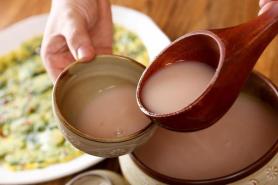
Makgeolli, also known as Korean rice wine or rice beer, is a milky-white alcoholic beverage that was commonly consumed by working-class people, especially farmers, in the past. Makgeolli is easy to make and only takes about one week to become ready to be bottled.
The typical Makgeolli has a relatively low alcohol content, around 5 degrees, making it a mild drink. However, due to its fast intoxication rate, it is nicknamed "stand-up brew." A person may not feel intoxicated when sitting and drinking Makgeolli, but the effects will kick in when he or she tries to stand up.
The Makgeolli UNESCO Intangible Cultural Heritage listing promotion committee said on December 14 that the committee was launched to globally spread the cultural significance of making Makgeolli, including its history and brewing methods, as an international coexistence value. The committee will also focus on the preservation of traditional Makgeolli brewing techniques.
UNESCO Intangible Cultural Heritage refers to cultural practices, traditions, expressions, knowledge, and skills that communities, groups, and, in some cases, individuals recognize as part of their cultural heritage. Unlike tangible cultural heritage, which includes physical artifacts such as buildings or artworks, intangible cultural heritage encompasses living expressions inherited from our ancestors.
UNESCO introduced the concept of intangible cultural heritage to recognize the importance of safeguarding the diverse forms of oral traditions, performing arts, social practices, rituals, festive events, traditional craftsmanship, and knowledge systems that communities pass down from generation to generation.
Copyright ⓒ Aju Press All rights reserved.



